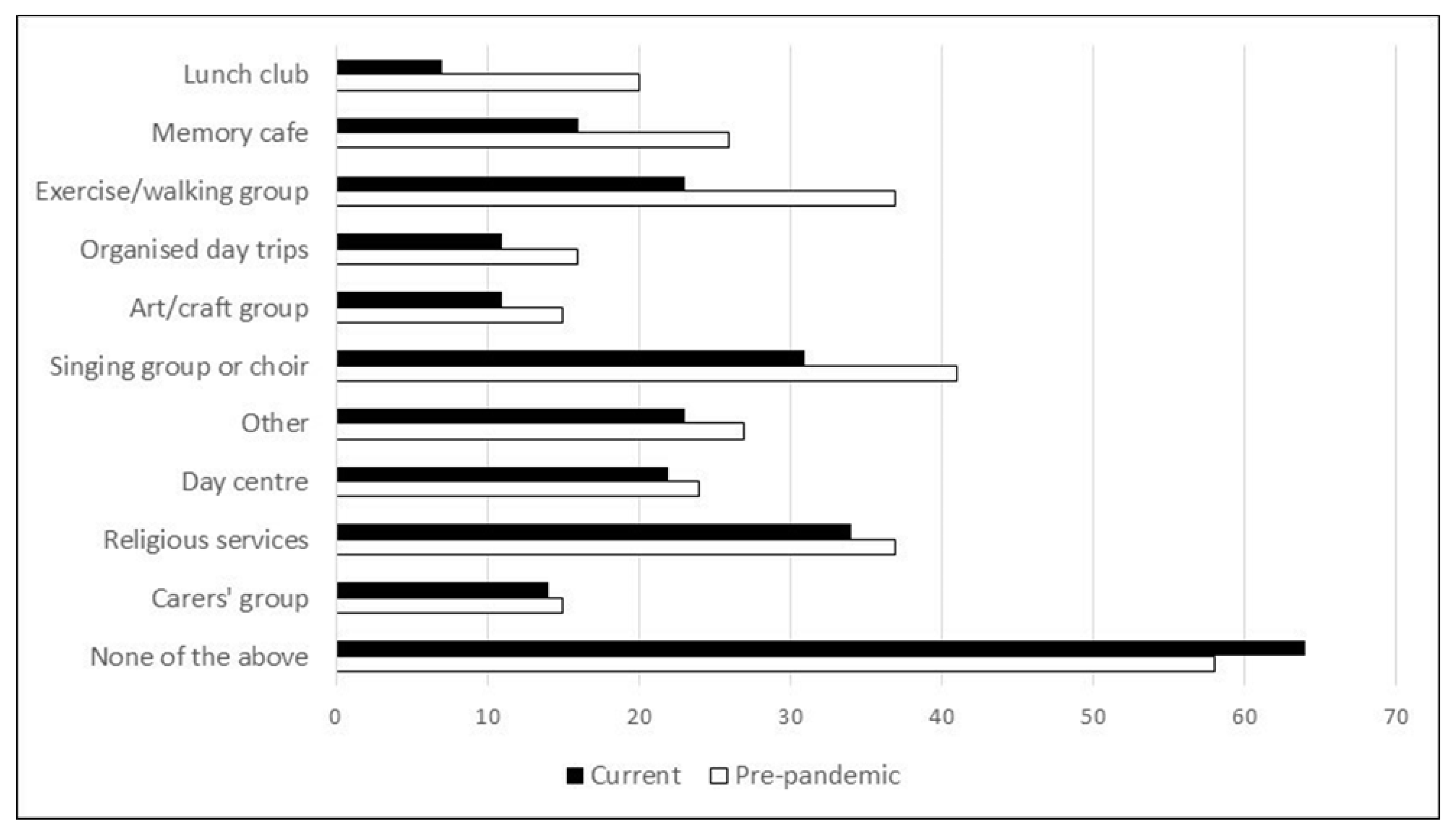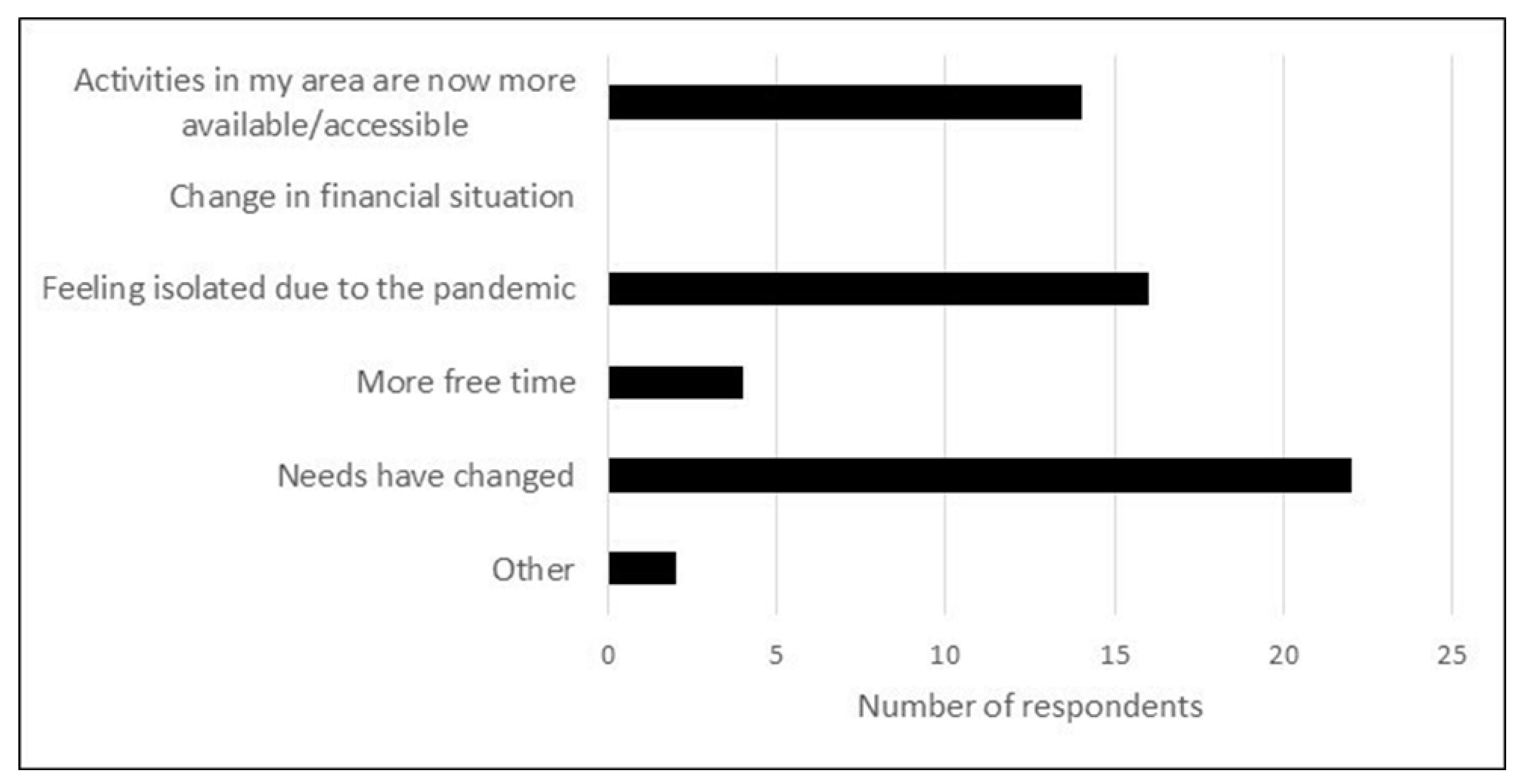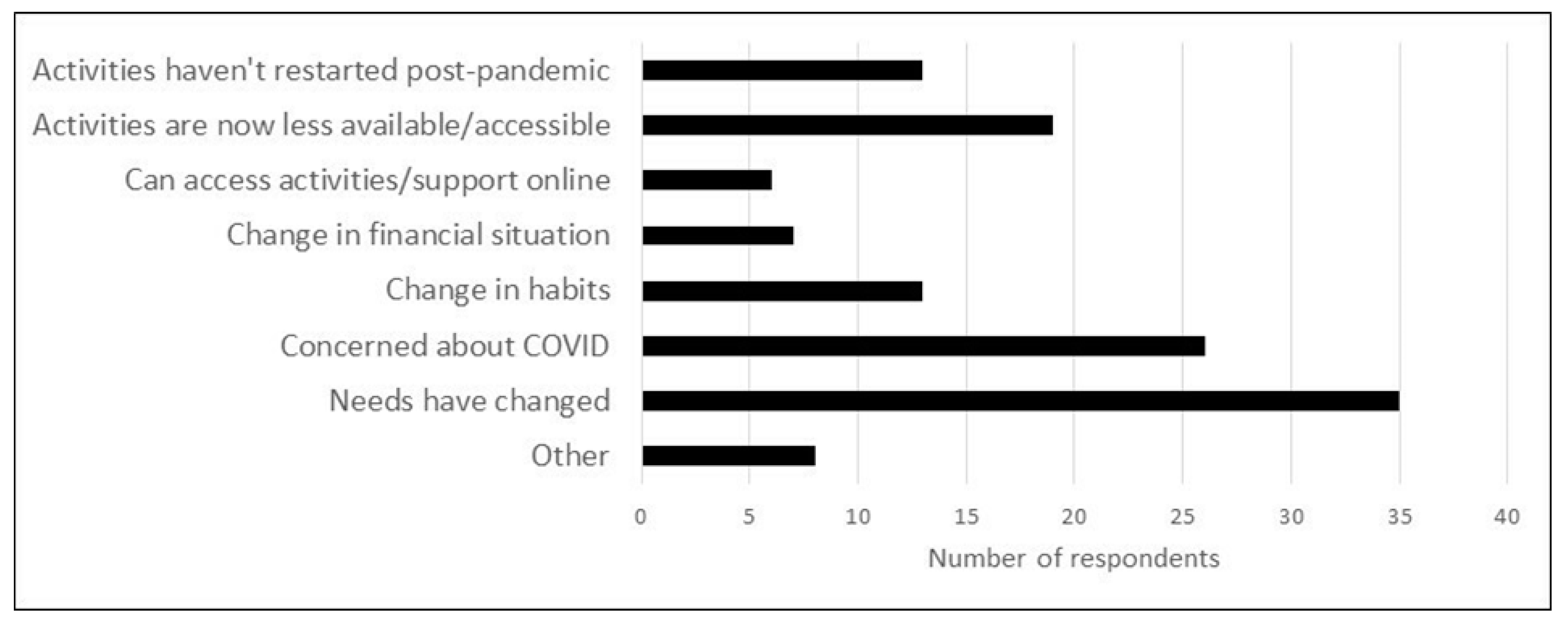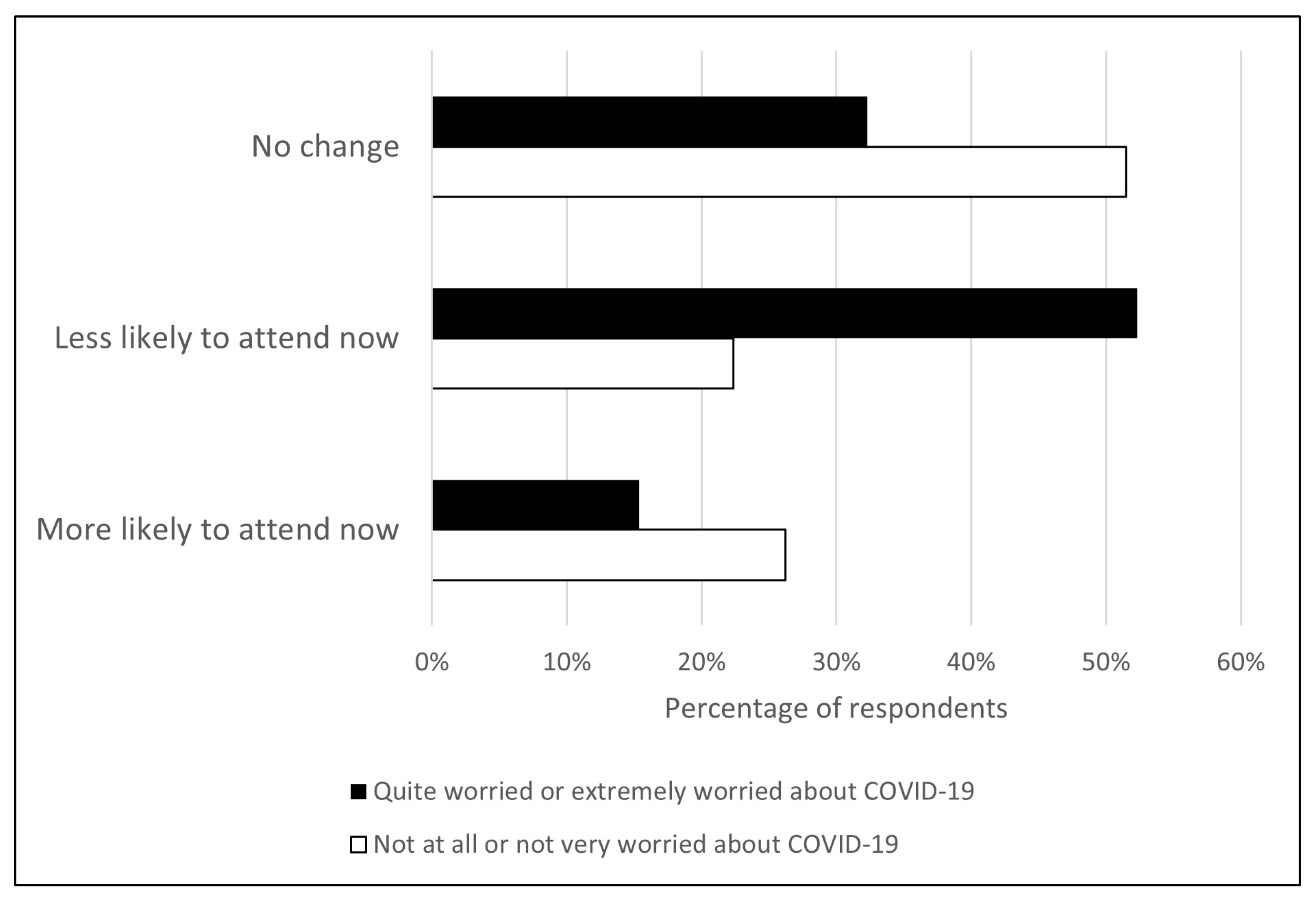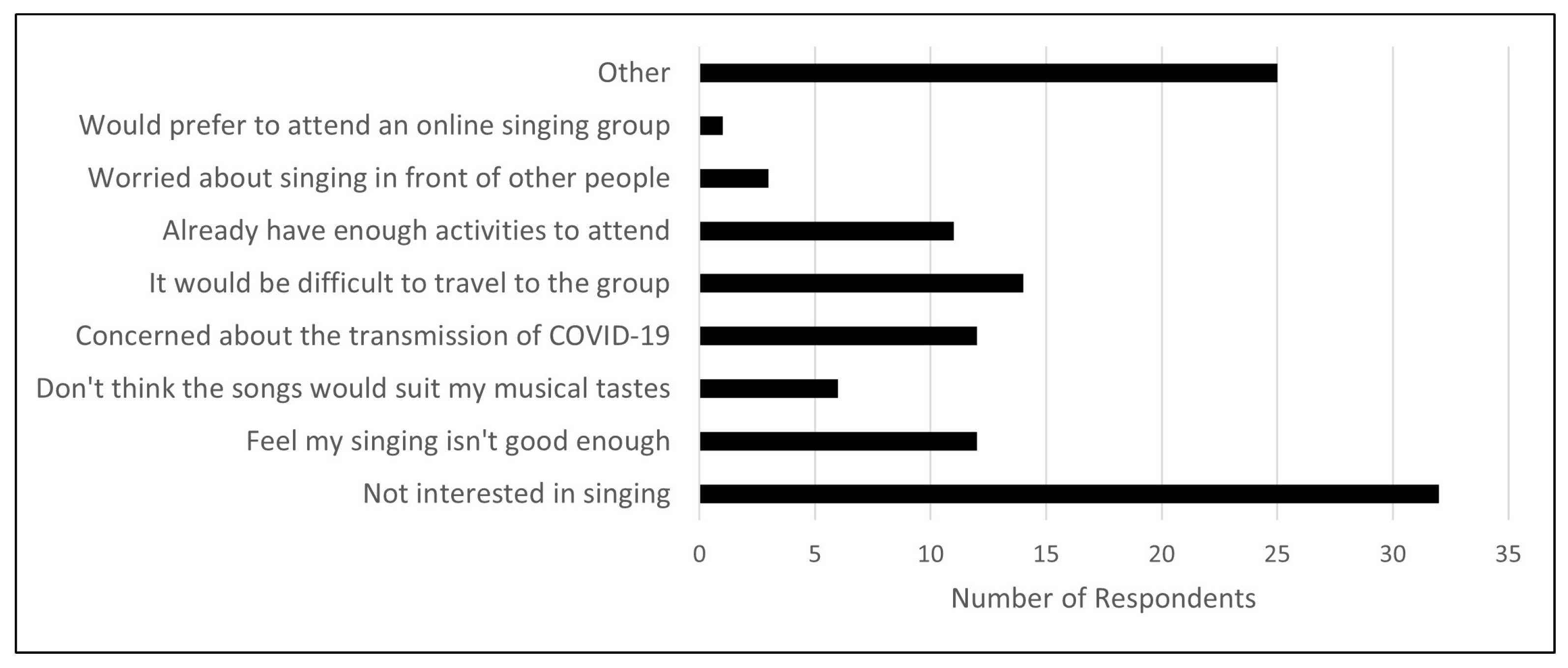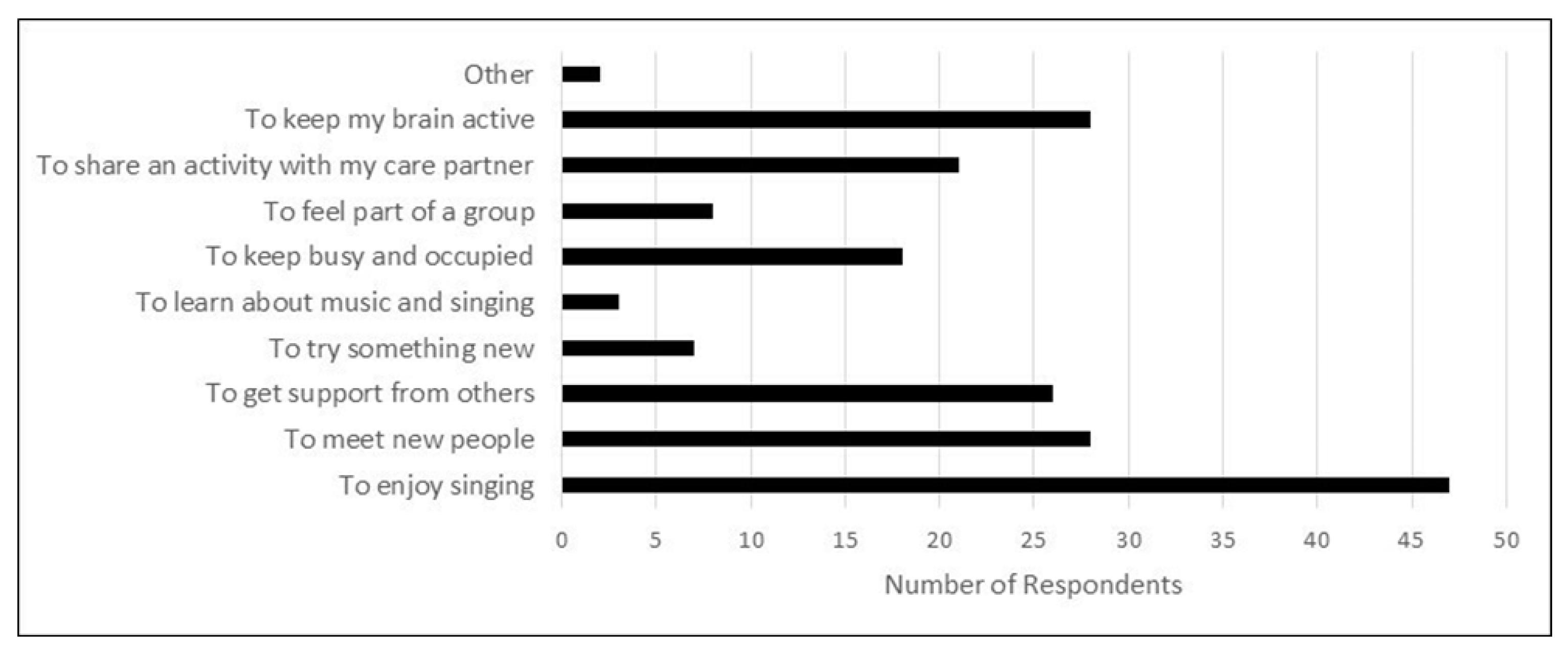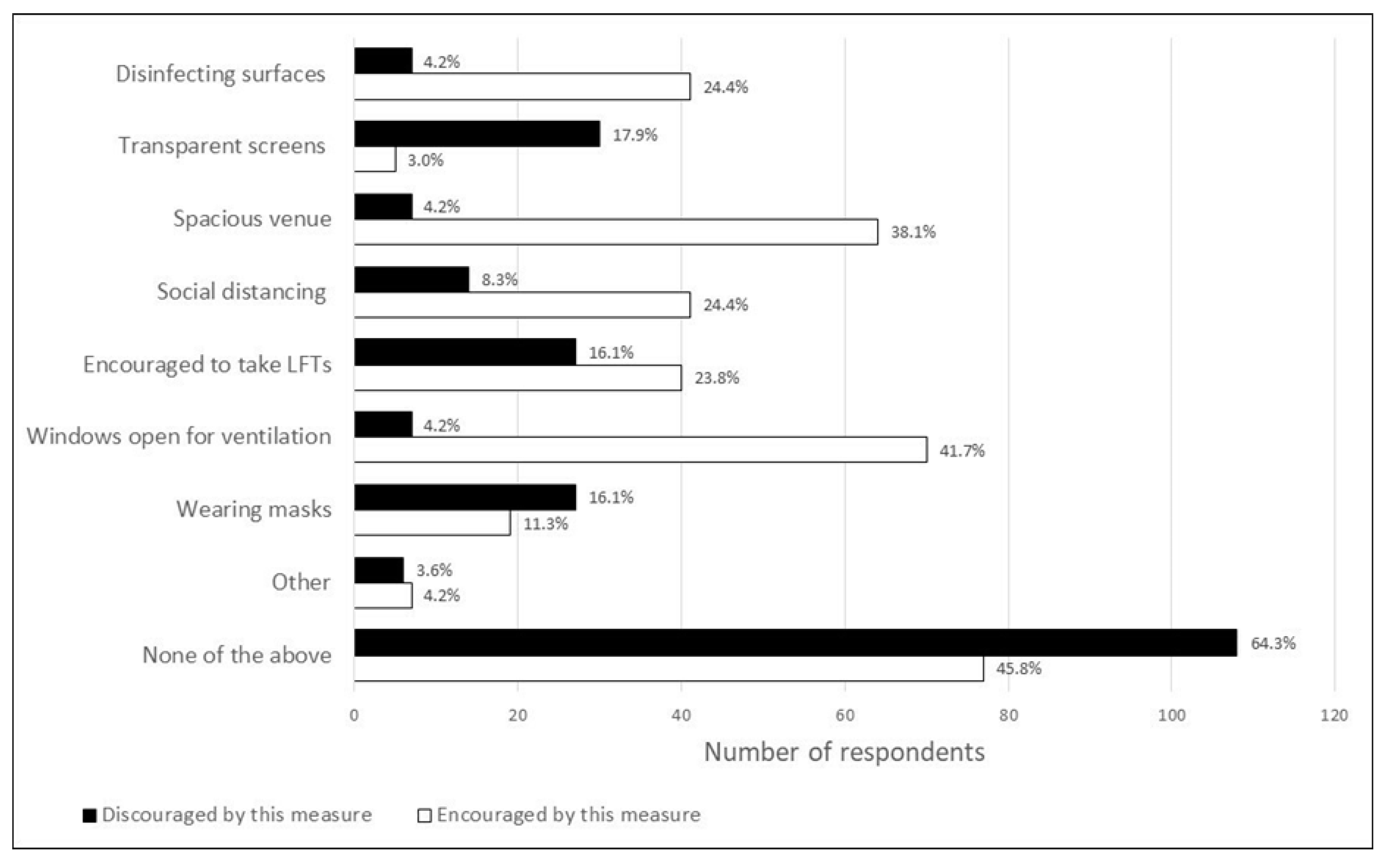Abstract
Aim: Our aim was to survey people with dementia and their carers with respect to their propensity to join a randomized trial of community singing in dementia, in the context of uncertainty following the COVID-19 pandemic. Method: We employed an online anonymous questionnaire, comparing activities before and after lockdown, worries about COVID-19, whether people would attend a singing group and what measures might make this more likely. With a target sample of 100, the survey was distributed to the general population of people with dementia and carers in the UK between June and August 2022. Results: We had a total of 168 respondents, of whom 30% were people living with dementia and 70% were carers. Those who were not worried (roughly 62%) were more likely to go out to groups. Worries about COVID-19 affected 38% of respondents but some judged the risk of going out to be worthwhile. Most felt able to take adequate precautions against infection. However, COVID-19 transmission was not the main impediment to attending a singing group and 19% of respondents were simply not interested in doing so, while mobility and shyness deterred others. Conclusions: Given recruitment problems, quantitative studies of singing in dementia need to take account of individual preferences as well as contextual barriers, including fear of virus transmission, individual perceptions of the intervention and logistical obstacles to participation.
1. Introduction
The survey reported here looks specifically at community-based music for people with dementia and provides evidence concerning recruitment and retention in the aftermath of the COVID-19 pandemic. The findings could inform research into psychosocial interventions in group settings by identifying variables that may affect pragmatic research of all kinds.
The COVID-19 pandemic had a profound impact on the lives of people with dementia and their carers. This group are at higher risk of developing severe illness from the virus and, under precautionary measures, they were obliged to cope with the loss of routines, activities and forms of support [1,2]. Carers felt isolated due to the loss of social support networks, together with diminished practical and emotional help [3]. As well as basic care services being disrupted, most face-to-face social and leisure activities for people living with dementia were either suspended or moved online.
The aim of this survey was to assess the impact of the COVID-19 pandemic on the viability of conducting a feasibility study for a randomized–controlled trial of community singing for people with dementia and their care partners [4] by looking at barriers to attendance at groups that might be preventable. We were aware that the context for our planned community-based study had changed significantly due to the impact of COVID-19 on our target population: people with dementia and their carers. We hypothesized a reduced demand for singing activities, either because people altered their habits, or due to ongoing concern about the risk of COVID-19. The survey reported here therefore aimed to gather data on how the attitudes and behavior of people with dementia and their carers towards attending social and leisure activities changed following the COVID-19 pandemic, and gain more specific insight into their attitudes towards attending singing groups.
The planned study—Pilot Randomized Evaluation of Singing in Dementia (PRESIDE)—was originally funded by the Alzheimer’s Society in 2019 but was interrupted at an early stage of recruitment by the pandemic. The feasibility study for an RCT was later funded by the UK National Institute for Health Research Social Care Research Committee (grant no. NIHR202982), with data collection starting in late 2022 (ISRCTN 10201482).
2. Materials and Methods
The online survey was designed to collect basic information, including whether the respondent was a person with dementia or a carer; if a carer, their relationship to the person with dementia; and how long the person with dementia had been diagnosed. Using a multiple-choice approach, it asked about activities and social groups which they had been attending prior to March 2020 and those which they were attending at the time they completed the survey. It also asked whether the likelihood of them attending face-to-face activities or groups had changed since before the pandemic and reasons for any change. The survey asked how worried they currently felt about the possibility of catching or transmitting COVID-19 at a social activity or group. More specifically, it then asked about attending a singing group for people with dementia and whether concerns about COVID-19 might deter them from attending such a group. Finally, it asked whether there were any infection control measures (such as ventilation, masks, testing) which might encourage or deter them from attending a singing group. The questions were followed by free-text boxes for adding additional options or explaining answers. The questionnaire was distributed on the JISC survey platform and is available in Supplementary Materials. The survey opened on 27 June 2022 and closed on 30 August 2022.
2.1. Inclusion Criteria
The inclusion criteria were people diagnosed with dementia, or carers of someone diagnosed with dementia, age 18+ and living in the United Kingdom. As this was an anonymous, online survey it was not possible to monitor whether participants met the inclusion criteria and we relied on their own self-assessment.
2.2. Recruitment
We set a recruitment target of 100 responses, and the survey was set to close automatically if it reached 200 responses. Recruitment was mainly undertaken through the online platform Join Dementia Research (JDR). JDR is an NIHR-funded database of people who have registered interest in taking part in dementia research. JDR users who met the inclusion criteria for the survey were automatically invited to take part by email. We also publicized the survey through social media and by circulating the link through our network of contacts and asking them to forward it to their service users. To avoid biasing the responses, we did not target singing- or music-focused networks.
2.3. Informed Consent and Ethical Approval
Participants were presented with information about the study when they followed the link to the survey. To proceed to the survey, they were required to tick a box indicating they had read the information and consented to take part. They were advised that if they did not wish to take part they should simply close the browser window. This study was reviewed by the Research Ethics Committee at the School of Sociology and Social Policy, University of Nottingham, and received a favorable opinion.
2.4. Data Analysis
The quantitative data were descriptively analyzed and represented graphically. The qualitative (free-text) data relating to respondents’ willingness to attend face-to-face activities were analyzed using a general inductive approach [5]. Free-text data were grouped for analysis according to the respondents’ level of concern about COVID-19 (extremely, quite or not at all worried). Each response was also placed in one of three “attitude to risk” categories: avoiding, accepting or dismissing.
3. Results
In total, 168 individuals completed the survey, with 51 (30.4%) being people living with dementia and the remaining 117 (69.6%) being carers. Most carers were the child or child-in-law (55.6%) of the person with dementia, or their partner/spouse (33.3%). More than half of people with dementia (55.4%) had been diagnosed with the condition for longer than three years, meaning that their diagnosis was already established well before the start of the pandemic. Nineteen per cent of the people with dementia had been diagnosed for 2 years or less, suggesting that they had received their diagnosis during the pandemic. A few had been diagnosed within the year post-pandemic and a few were ‘not sure’ when they received their diagnosis.
Figure 1 shows the difference between the activities undertaken by the person with dementia supported by their carer before and after the pandemic lockdowns in 2020–2021. Asked whether the likelihood of going out to activities had changed for them, 44% of respondents said no. However, 22% said that they were more likely to attend groups—their reasons are given in Figure 2—and 34% said they were less likely to attend groups (Figure 3).
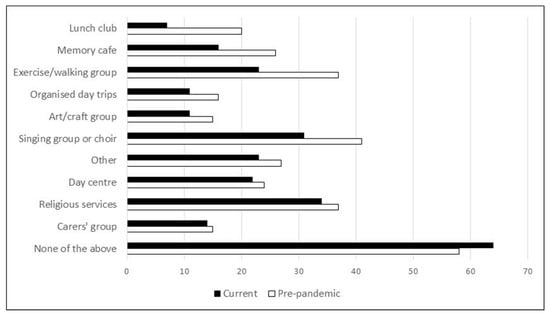
Figure 1.
Activities undertaken currently and pre-pandemic (Number of respondents).
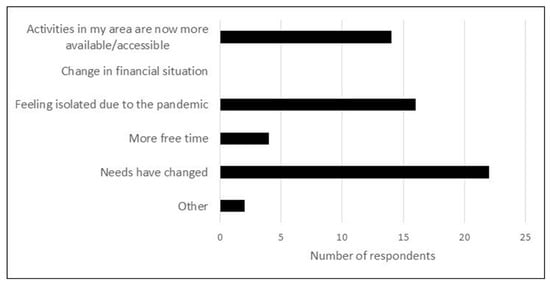
Figure 2.
Why people were more likely to go out post-COVID-19.
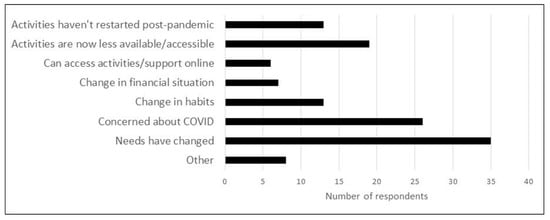
Figure 3.
Why people were less likely to go out post-COVID-19.
The ‘other’ activities named were: dancing, golf, swimming, gym, educational courses, the Women’s Institute, private daycare, a computer group for older people and football (season ticket holder). The reasons for being more likely to go out are shown in Figure 2 (respondents could give more than one reason). Nobody stated that their financial situation had changed but 22 people (13%) stated that their needs had altered and 16 (9.5%) that they felt isolated due to the pandemic.
The reasons why people said they were less likely to go out are shown in Figure 3. Needs had changed for 35 people (21%) and 26 (15%) had concerns about COVID-19 that deterred them from going to activities. The ‘other’ reasons included two respondents who said they had never been very sociable, three who had grown less sociable, possibly due to dementia progression, one who risked a severe response if they contracted COVID-19 and one whose caring responsibility kept them at home.
When asked whether they were worried about catching or transmitting COVID-19, 39% stated that they were ‘quite’ (9%) or ‘extremely’ (30%) worried. Despite expressing similar levels of concern, some people in this category had very different responses when calculating the relative levels of risk and benefit for their personal situation. A few indicated that they would accept a calculated level of risk in order to take part in activities they valued, while others chose to stay home. For example, one respondent wrote, “It doesn’t limit our activities. I know it’s a possibility for Dad and for me, but I’m careful with mask wearing and social distancing where possible”, while another said, “Infections are on the increase and my father is vulnerable so I do not feel the benefits of the groups outweigh the risks”. This respondent went on to describe how their father’s dementia had progressed to a stage where they did not feel he would benefit much from attending a group. By comparison, 16% were not worried at all and the largest proportion of respondents, 45%, were only slightly worried. This is clearly associated with their propensity to go to groups, with worried people less likely to go out and unworried people more likely to do so (Figure 4).
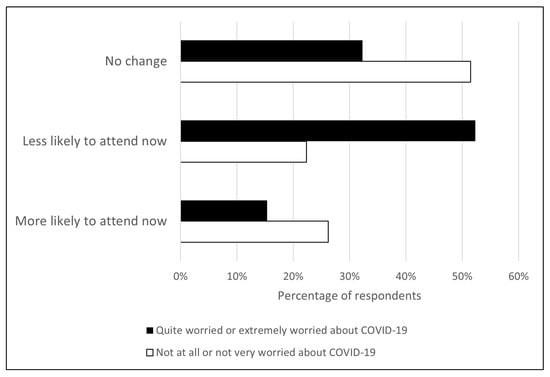
Figure 4.
Association between worries about COVID-19 and going out to groups.
A total of 76 respondents (45%) said that they were ‘not very’ worried about COVID-19, of whom 67 explained their response. Of these people, 29 felt that they were now protected by vaccination, and 21 felt reassured by anti-COVID precautions (e.g., social distancing, ventilation). Nine people considered that the benefits of social activity outweighed the risks posed by COVID-19: “The devastating effect of isolating has progressed the Alzheimer’s a hundred-fold. That physical face to face contact basically kept my husband going. It is so worth the risk of getting Covid particularly as we are now full of vaccine”. Seven respondents expressed the view that it was time to start “living with the risk” of COVID-19, three felt it was time to “get on with life” and two had the view that “what will be, will be”. Eight people felt somewhat reassured by the fact that they had already had COVID-19 and had not experienced very bad symptoms. Most people who were “not very worried” indicated they were prepared to accept the risk of COVID-19 in order to attend activities, while seven felt that the precautions they took enabled them to avoid the risk, and three had a dismissive attitude towards COVID-19 risk. Those who were ‘not at all’ worried about COVID-19 gave similar explanations for their attitude. The people who were unworried were roughly equally divided between those who were prepared to accept a degree of risk, which they did not perceive as very threatening, and those who were dismissive about the risk altogether.
Singing Groups
The questionnaire asked about people’s likelihood of attending a singing group if one were available and what obstacles might stand in the way. In total, 9% already attended a group, and 50% of respondents stated that they would be unlikely to go to one. The reasons for not taking up a singing opportunity are shown in Figure 5. While some cited concerns about COVID-19, it is notable that 32 people (19%) were not interested in singing, while 6 (4%) thought the songs would not suit their taste and 12 (7%) judged that their singing was not good enough. Analysis of the ‘other’ reasons given showed that 10 carers were responding about a relative whose dementia was judged to be too advanced for them to benefit from a singing group. A similar number of respondents stated that their loved one ‘would not be interested’ or had behavioral problems which prevented them from attending. At least 30% of respondents therefore ruled themselves out of the singing intervention.
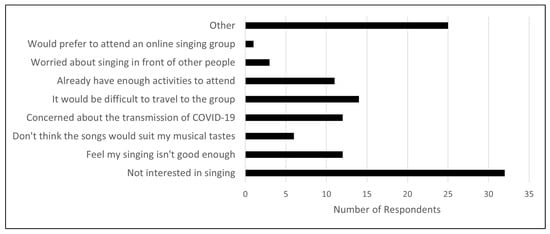
Figure 5.
Reasons given for not attending hypothetical singing groups.
The positive motivations given by people who said that they would attend singing groups ranged from enjoyment of singing to keeping active and meeting new people (Figure 6).
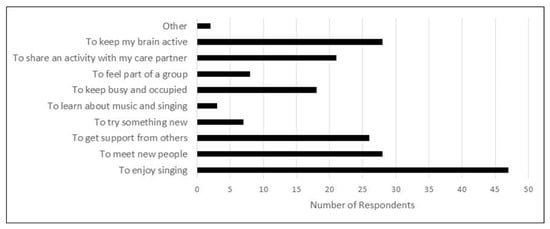
Figure 6.
Reasons for attending hypothetical singing groups.
The survey asked what could be implemented to make singing groups more or less attractive; responses are shown in Figure 7. Most of the measures were more likely to encourage participants to attend than to discourage them from attending, although the exceptions to this were “Transparent screens between participants” and “Wearing masks when not singing”. However, 64.3% of respondents said that no measures would discourage them from attending, while 45.8% said that no measures would encourage them to attend.
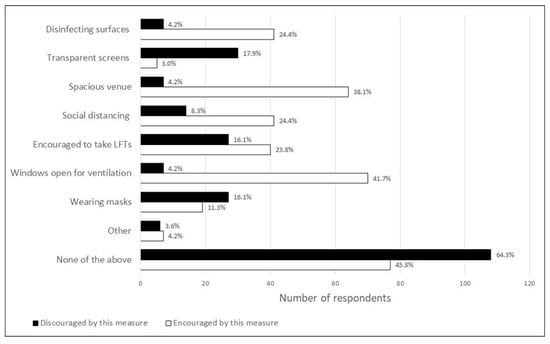
Figure 7.
Impact of risk mitigations on likelihood to attend singing group.
4. Discussion
We know from research that attending group activities, including group singing, has a range of cognitive, social and emotional benefits for people living with dementia and their carers alike [6,7]. If the provision of, or attendance at, such groups has declined post-pandemic, this raises the concern that many people are not able to access activities which could make a significant contribution to their wellbeing. Therefore, we examine here the factors which may influence attendance, noting barriers that are preventable.
While the survey respondents reported a wide range of activities undertaken by people with dementia and their carers, it also showed that there is a considerable proportion of people with dementia—more since the pandemic—who do not go out to any kind of activity. Some of these people live in residential care, some are by nature anti-social, but many are judged to be too disabled by dementia to be able to participate. The impact of the pandemic has increased the stay-at-homes by making some people so worried about the risk of infection that they are less motivated to join groups, including singing groups. This number may change over time; depending on the trajectory of the disease, it could increase or decrease. The survey also demonstrates that, despite the effects of the pandemic, there is demand for supportive group activities for people with dementia and their carers. Indeed, some of the free-text data vividly illustrate the profoundly negative effect that COVID-19 restrictions had on those living with the condition (“That physical face-to-face contact basically kept my husband going”). This presents a dilemma for those carers and people with dementia who have concerns about virus transmission. Extra help and personalized solutions may be needed to enable them to access the peer support and group experiences that are a vital part of living well with dementia.
It is noteworthy that ‘changing needs’ are a factor that could both increase and decrease propensity to join groups. This suggests that there is an interim period in the progression of dementia when activity groups are seen as beneficial. Prior to that, in the early stages of the disorder, some people evidently retain their usual hobbies and leisure pursuits (golf, gym, swimming, education), while in its later stages the impairments of dementia can prevent those affected from engaging with group activities. We found that the progression of dementia during lockdown (stated as free-text responses pertaining to Figure 5) led to some respondents withdrawing (or being withdrawn by their carer) from activities outside the home. This can adversely affect research; decline in functional ability among people with dementia was judged by Matziorinis et al. to be the largest reason for drop out among their study participants [8]. However, the incidence of dementia is such that people entering the later stages of the disorder could be replaced as candidates for involvement by people entering the earlier stages, so a study design that permits continuous recruitment may overcome this problem.
The findings from the present survey have implications for future studies because they identify additional contextual issues that need to be understood by researchers. Worries about COVID-19 are clearly a factor and, in future, fluctuating virus levels may present an unpredictable impediment to research in relation to singing. Importantly, in addition to worries about COVID-19, 19%—nearly one in five people—told us that they would not attend music interventions because these simply do not appeal to them. Even among those who were willing to join a singing intervention, some were prevented by lack of transport and other reasons (Figure 5), further restricting the availability of study participants. When music is promoted as a near-panacea in dementia, these factors affecting individuals may be overlooked.
The survey also points to steps that could be taken to increase research participation rates. In some cases, certain infection control measures may be called for, specifically ventilation, a spacious venue and disinfection of surfaces. For a small minority, provision of transport may help to boost attendance. With regard to singing in particular, a substantial proportion of potential participants seem unimpressed with its potential to bring them enjoyment or felt that what was on offer would not suit their taste (Figure 5). A more proactive approach to promoting the intervention may be indicated, while an individualized approach to music-based interventions may help to recruit people who have strong preferences about how they engage with music.
Limitations
The inferences that can be drawn from this survey need to take account of its limitations. The data collected in this study reflect the situation at a certain point in time (Summer 2022) and are not necessarily representative of the way things are at the time of writing (July 2023). However, given the wide-ranging impacts of the pandemic, it seems probable that the spectrum of attitudes and behaviors which were captured in this survey are still affecting habits and attendance at activities now and are likely to endure. A further limitation of this survey is that it was conducted online and circulated primarily through online methods. This means that the sample may be skewed towards people who are able to access and use technology. This group of people might tend to be younger and from a higher socio-economic group and therefore might not be fully representative of the spectrum of people living with dementia and their carers. Additionally, since the survey includes questions about activities that people did more than a year in the past, their responses may have been affected by poor recall. Furthermore, the survey lacks reliable diagnostic data and relies largely on carers’ judgements about their loved ones, rather than first-hand responses.
5. Conclusions
This paper offers some evidence about the impact of the pandemic on recruitment to a singing RCT and similar studies of psychosocial interventions in dementia, which increases understandings of contextual factors affecting recruitment. Potential obstacles to activity attendance and hence to research participation include fear of virus transmission and, for some, transport issues. These issues can be mitigated to some extent. However, the findings of indifference to or preconceptions concerning the intervention (in this case, singing) and personal preferences not to socialize appear to be unrelated to the pandemic. These factors deter a sizeable proportion of potential participants and should be taken into account in recruitment to research with people with dementia living in the community.
Supplementary Materials
The following supporting information can be downloaded at: https://www.mdpi.com/article/10.3390/jdad2010006/s1: Activities and Dementia Survey V1.
Author Contributions
B.D. and J.S. performed all the work together. All authors have read and agreed to the published version of the manuscript.
Funding
This research was funded by the Alzheimer’s Society UK (grant no. 400 AS-PG-17b-009) and UK National Institute for Health Research, Social Care Research Committee (grant no. NIHR202982).
Institutional Review Board Statement
The School of Sociology & Social Policy at the University of Nottingham, UK, reviewed the study favorably. Participants consented by completing the questionnaire after reading an online information sheet.
Informed Consent Statement
Consent was implied when participants voluntarily chose to complete the survey.
Data Availability Statement
The raw data supporting the conclusions of this article will be made available by the authors on request.
Acknowledgments
The survey was suggested by Martin Orrell.
Conflicts of Interest
The authors declare no conflicts of interest.
References
- Brooke, J.; Jackson, D. Older people and COVID-19: Isolation, risk and ageism. J. Clin. Nurs. 2020, 29, 2044–2046. [Google Scholar] [CrossRef] [PubMed]
- Jordan, R.E.; Adab, P.; Cheng, K.K. COVID-19: Risk factors for severe disease and death. BMJ 2020, 368, m1198. [Google Scholar] [CrossRef] [PubMed]
- Greenberg, N.E.; Wallick, A.; Brown, L.M. Impact of COVID-19 pandemic restrictions on community-dwelling caregivers and persons with dementia. Psychol. Trauma 2020, 12, S220–S221. [Google Scholar] [CrossRef] [PubMed]
- Dowson, B.; Schneider, J.; Guo, B.; Bath, P.M.; McDermott, O.; Haywood, L.J.; Orrell, M. Pilot Randomised Evaluation of Singing in Dementia (PRESIDE): Protocol for a two-arm, parallel-group randomised controlled feasibility study with waiting-list control. Pilot Feasibility Stud. 2021, 7, 15. [Google Scholar] [CrossRef] [PubMed]
- Thomas, D.R. A general inductive approach for analyzing qualitative evaluation data. Am. J. Eval. 2006, 27, 237–246. [Google Scholar] [CrossRef]
- Särkämö, T.; Laitinen, S.; Numminen, A.; Kurki, M.; Johnson, J.K.; Rantanen, P. Pattern of Emotional Benefits Induced by Regular Singing and Music Listening in Dementia. J. Am. Geriatr. Soc. 2016, 64, 439–440. [Google Scholar] [CrossRef] [PubMed]
- Tamplin, J.; Thompson, Z.; Clark, I.; Teggelove, K.; Baker, F. Remini-Sing RCT: Therapeutic Choir Participation for Community-Dwelling People with Dementia and Their Primary Caregivers. J. Music Ther. 2024, 61, 263–287. [Google Scholar] [CrossRef] [PubMed]
- Matziorinis, A.M.; Flo, B.K.; Skouras, S.; Dahle, K.; Henriksen, A.; Hausmann, F.; Sudmann, T.T.; Gold, C.; Koelsch, S. A 12-month randomised pilot trial of the Alzheimer’s and music therapy study: A feasibility assessment of music therapy and physical activity in patients with mild-to-moderate Alzheimer’s disease. Pilot Feasibility Stud. 2023, 9, 61. [Google Scholar] [CrossRef] [PubMed]
Disclaimer/Publisher’s Note: The statements, opinions and data contained in all publications are solely those of the individual author(s) and contributor(s) and not of MDPI and/or the editor(s). MDPI and/or the editor(s) disclaim responsibility for any injury to people or property resulting from any ideas, methods, instructions or products referred to in the content. |
© 2025 by the authors. Licensee MDPI, Basel, Switzerland. This article is an open access article distributed under the terms and conditions of the Creative Commons Attribution (CC BY) license (https://creativecommons.org/licenses/by/4.0/).

